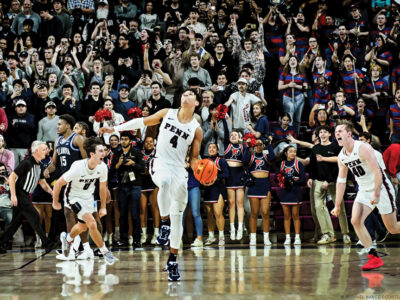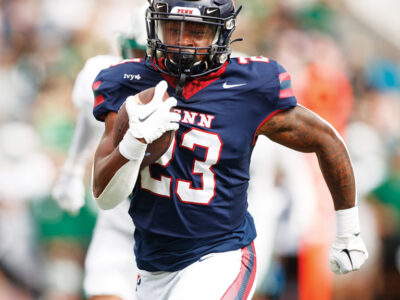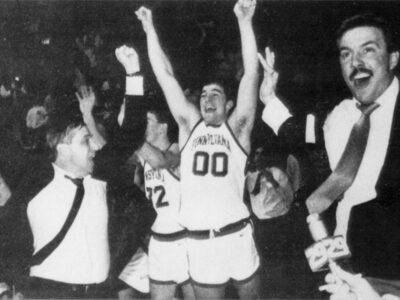By Dave Zeitlin
Through the first three games of the 2011 Ivy League season, the Penn football team, you might say, was living on the edge. A game-winning touchdown with 17 seconds left—the Quakers’ only TD of the game —was the difference against Dartmouth in the conference opener. Two weeks later, they scored with 25 seconds left to beat Columbia. A week after that, they ripped off a whopping 27 points in the fourth quarter to turn a 10-point deficit into a 12-point, come-from-behind win over Yale.
All the while, Penn’s historic Ivy League win streak gained momentum and speed as the Quakers churned toward what they hoped to be their third straight undefeated conference season. After their first three dramatic wins, they were only four victories away from becoming the first Ivy League team to ever accomplish such a feat. History seemed within reach.
But there were signs that Penn’s run atop the league might be coming to an end. Whereas in the past the Quakers steamrolled Ivy opponents, they were suddenly scraping by against some of the league’s traditional bottom-dwellers. There were injuries, too. And enough inexperience and inconsistency to give head coach Al Bagnoli pause, even while his team was winning. “You knew,” Bagnoli said, “you were dodging a bullet for only so long.”
In the end, the Quakers couldn’t sustain their habit of living on the edge. Instead, they fell off it. A week after their fourth-quarter comeback against Yale, Penn traveled to Brown on a cold, rainy day and was shut out, 6-0, which ended the program’s Ivy League winning streak at 18 games. (It was the second best streak in league history, behind only the Penn teams that won 20 consecutive games from 2001-04.)
Two weeks later, the Quakers lost to Harvard, and any hopes of a third straight Ivy League championship disappeared, too.
After falling to Cornell in its season finale, Penn finished the mostly disappointing 2011 campaign with a 5-5 overall record and a 4-3 mark in the Ivy League, tying for second place in the conference along with three other teams, well back of undefeated Harvard, which also beat out Penn for the Ivy crown in 2008. For many of the Penn players, who knew nothing but success in 2009 and 2010, this year marked the first time they ever experienced losing.
“That’s one of the beauties of sports—you have to be able to handle the ups and you have to be able to handle the downs,” Bagnoli said. “We knew this was going to be a very challenging year. There were a lot of things our kids had to overcome. You throw on top of that injuries and you’ve got a program that’s very, very young and a program that’s being forced to play at a high level week in and week out because of where we were with the streak and everything else.”
While Bagnoli did his best to brush aside talk of the streak throughout the season, there was no escaping it. Whether he liked it or not, it was part of the narrative of Penn’s 2011 season, well ahead of the fact that the Quakers had to cope with the loss of 33 graduated seniors from the 2010 squad, or that they had a brutally tough schedule that included night games and road matchups against the league’s premier teams. Bagnoli also noted that few people outside the program realized that, because of injuries, the team redshirted “15 or 16 kids,” which is “unheard of for our league.” Many of the players who were sidelined, the coach said, would have likely been key contributors.
Perhaps in the end, the expectations were simply too high, the burden of the streak too much to bear. “We had a lot of really good young players,” senior linebacker Erik Rask said, “but some of them were put into the fire a little earlier than they were probably ready for.”
Luckily, those youngsters will have the opportunity to come back next season—with a little more experience—and attempt to restore Penn’s winning tradition. Highlighting that list of returners is quarterback Billy Ragone, who, in many ways, served as a microcosm for Penn’s up-and-down season. In some games, like the win over Yale on October 22 when he fueled the comeback by running and passing for a total of 330 yards and four touchdowns, he was brilliant. In other games, he made too many mistakes for his team to win.
But the good news for Penn fans is that Ragone—who’s already become the first Penn player in program history with 1,000 career rushing yards and 2,000 career passing yards—still has two remaining years of eligibility. There’s a lot more he can still accomplish.
“We have to have a little less peaks and valleys with him and see more of the good Billy,” Bagnoli said. “He’s capable of doing that. He’s an immensely talented kid who can do anything he wants to do. We just have to work on the overall consistency factor with him.”
For other players, there is no next year. Still, it was hard for the program’s seniors to feel too sorry for themselves. Over the last four years, after all, their class compiled a 28-12 overall record, a 23-5 mark in the Ivies, back-to-back conference championships and the second-longest winning streak in league history.
Some of them were rewarded for their personal accomplishments, with Rask and senior offensive lineman Greg Van Roten becoming Penn’s first unanimous first team All-Ivy selections since 2006. Senior receiver Ryan Calvert and junior defensive lineman Brandon Copeland were also first team honorees, and Rask was named one of two finalists for the inaugural Asa S. Bushnell Cup Ivy League Defensive Player of the Year Award.
“First and foremost, being a part of two undefeated championship teams is something really special,” said Rask, who led the team with 83 tackles and capped his dominant season with an interception and a touchdown in his final collegiate game. “We didn’t get to win our third straight Ivy championship this year. But, in the end, I wouldn’t trade my four years here for anything.”
Early-Season Test for Men’s and Women’s Hoops Squads
When his players took the floor for a non-conference game on December 2, Penn women’s basketball coach Mike McLaughlin expected to see some scared eyes and some shaky hands.
Those kinds of reactions would be understandable. The Quakers were on the road, playing in front of more than 8,000 fans, against one of the best teams in the nation. But McLaughlin didn’t see any of that. Instead, he saw a group of girls eager to compete against third-ranked Notre Dame, the reigning national runner-up.
Though the Quakers ended up losing to Notre Dame, 69-38, they were able to take some positives from the defeat, including the fact that they held the Fighting Irish to well below their season scoring average.
Playing premier programs is more common for Penn’s men’s basketball team. When the schedule came out, many fans noticed that five of the first 14 games were against nationally renowned programs (Temple, Villanova, Pittsburgh, UCLA, and Duke). The Quakers didn’t back down, taking Temple to overtime in their home opener, before staying right with Pitt and ’Nova. Penn didn’t win any of those games but even senior point guard Zack Rosen, a staunch opponent of the phrase “moral victory,” admitted the near-misses should benefit the team when Ivy League play begins in January.
“I think we’ve got something to build on,” said Rosen after the Quakers’ 73-65 setback to Villanova on Dec. 3. “I thought we played well enough to win in the second half.”
Thanks to Rosen, the Quakers have played well enough to win just about every time they’ve stepped out on the floor. Through the first nine games of the season, the senior guard was averaging 21.3 points per game while shooting a blistering 57.3 percent from the field and an unheard-of 58.5 percent from three-point range.
The women’s team has been boosted by a little star power of its own with sophomore Alyssa Baron, the reigning Ivy League Rookie of the Year, who according to McLaughlin, came back “bigger, stronger, and faster than last year.” Combined with a deep freshman class headlined by 6-foot-1 forward Kara Boneberger, the young Quakers won four of their first five games of the season, which marked the best start in program history.
“We know it’s a small sample size,” said McLaughlin, who’s in his third year at Penn. “We know in sports, things change and sometimes change in a hurry. But we’re happy with where we’re at.”
Both of Penn’s hoops teams know that, in the end, it all boils down to the daunting 14-game Ivy League season.
The Princeton women and Harvard men will be heavy favorites to win the league this year. But, luckily for both Quaker squads, they know what it’s like to play against heavy favorites. That’s where the importance of those tough non-conference games comes into play.
Dave Zeitlin C’03 writes frequently for the Gazette and oversees the magazine’s sports blog.




